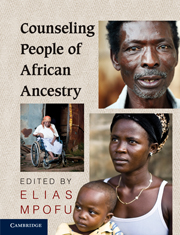Book contents
- Frontmatter
- Contents
- Contributors
- About the Editor
- Editorial Board
- Foreword
- Preface
- Acknowledgments
- PART 1 FOUNDATIONS OF COUNSELING IN AFRICAN SETTINGS
- 1 Indigenous Healing Practices in Sub-Saharan Africa
- 2 The Role of the Oral Tradition in Counseling People of African Ancestry
- 3 Assessment for Counseling Intervention
- 4 Research on Counseling in African Settings
- 5 Deconstructing Counseling Psychology for the African Context
- 6 Racial Oppression, Colonization, and Identity: Toward an Empowerment Model for People of African Heritage
- PART 2 CONTEXTS OF COUNSELING
- PART 3 COUNSELING APPLICATIONS
- PART 4 THE FUTURE OF COUNSELING IN AFRICAN HERITAGE SETTINGS
- Counseling People of African Ancestry Multiple Choice Answers
- Index
4 - Research on Counseling in African Settings
Published online by Cambridge University Press: 05 August 2011
- Frontmatter
- Contents
- Contributors
- About the Editor
- Editorial Board
- Foreword
- Preface
- Acknowledgments
- PART 1 FOUNDATIONS OF COUNSELING IN AFRICAN SETTINGS
- 1 Indigenous Healing Practices in Sub-Saharan Africa
- 2 The Role of the Oral Tradition in Counseling People of African Ancestry
- 3 Assessment for Counseling Intervention
- 4 Research on Counseling in African Settings
- 5 Deconstructing Counseling Psychology for the African Context
- 6 Racial Oppression, Colonization, and Identity: Toward an Empowerment Model for People of African Heritage
- PART 2 CONTEXTS OF COUNSELING
- PART 3 COUNSELING APPLICATIONS
- PART 4 THE FUTURE OF COUNSELING IN AFRICAN HERITAGE SETTINGS
- Counseling People of African Ancestry Multiple Choice Answers
- Index
Summary
OVERVIEW. This chapter focuses on current research that illuminates counseling practices in African settings. The aim of this focus is first to examine and critique historic and current counseling practices in sub-Saharan Africa, and second, to provide an analysis of the available research that has been conducted on these practices. A recurrent theme in this chapter is an emphasis on the importance of empirically investigating counseling practices and how they are applied in African settings; such rigorous inquiry includes both quantitative and qualitative methods.
In the first part of the chapter, we examine specific constructs, offering working definitions that are contextually relevant to research on counseling in African settings. In the second part, we discuss relevant historical and cultural issues that anchor an understanding of counseling-related research in Africa. In the third part, we offer a look at current counseling practices and related research in African settings. In the fourth part, we provide an evidencebased discussion concerning the efficacy of counseling practices and research, as these are applied in African settings. In the following three parts of the chapter, we examine the cultural legacy of counseling practices in Africa, identify related disciplines, and discuss comparative indigenous practices. We conclude the chapter by identifying the implications for future research in African settings. Supplemental instructional features follow, which can serve as the basis for classroom discussion or as a means for helping the individual reader respond to the material.
- Type
- Chapter
- Information
- Counseling People of African Ancestry , pp. 57 - 74Publisher: Cambridge University PressPrint publication year: 2011
- 10
- Cited by

